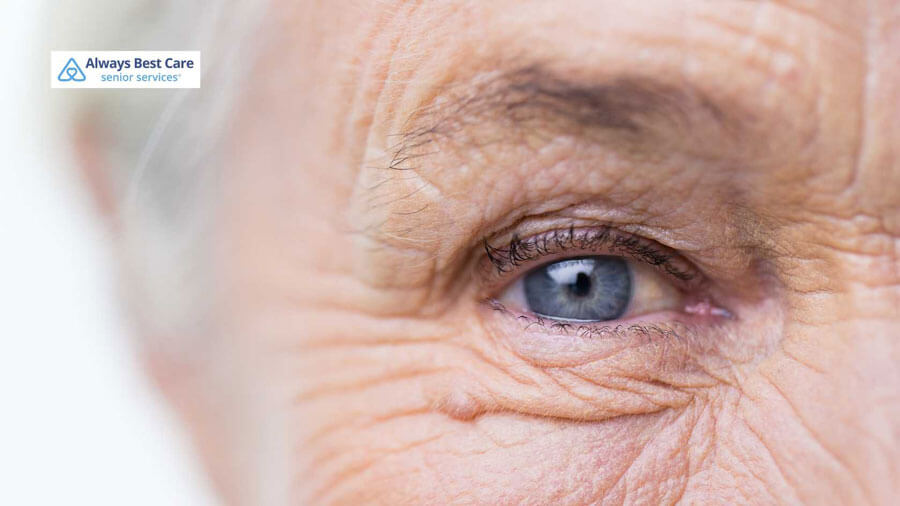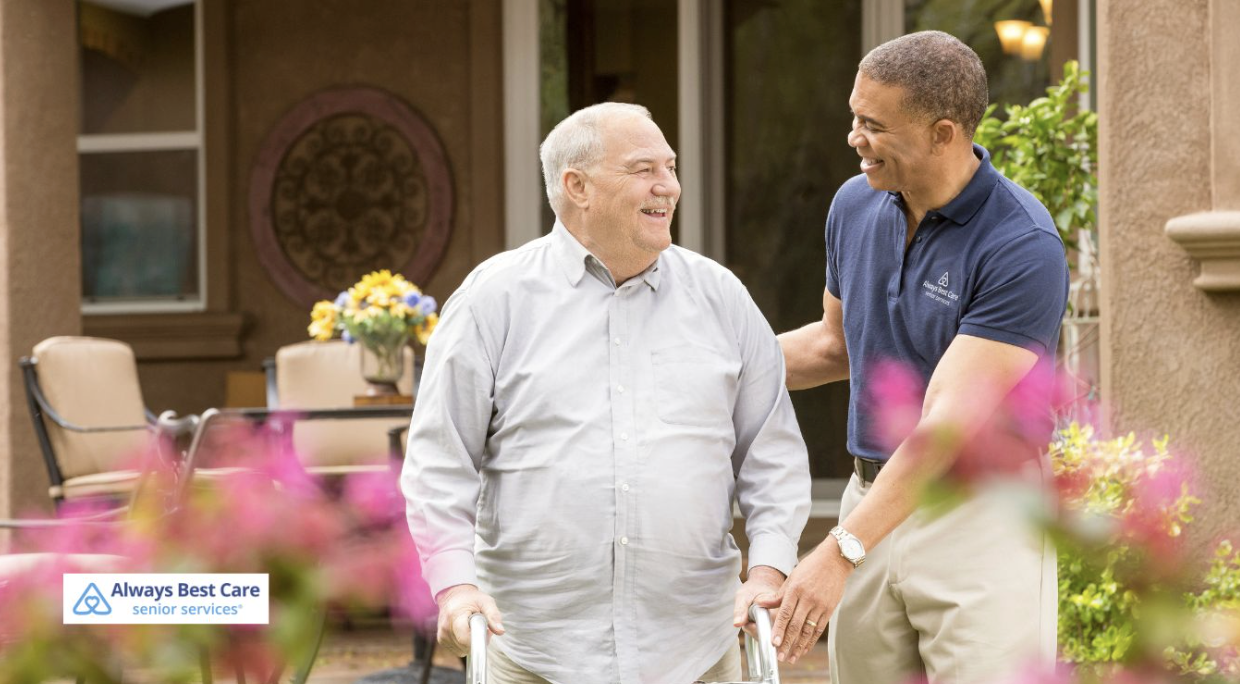Living With Glaucoma: Practical Strategies for a Fuller Life

Glaucoma may be a chronic condition, but its impact doesn’t have to steal the joy of everyday life. As one of the leading causes of vision loss, especially among older adults, glaucoma often develops quietly, affecting the optic nerve before symptoms appear.
While it cannot be cured, the progression can be managed with early detection, proper treatment, and thoughtful lifestyle adjustments.
January, recognized as Glaucoma Awareness Month, is a time to focus on awareness and empowerment. Living with glaucoma means finding new ways to adapt, thrive, and embrace independence.
Table of Contents
Creating a Safe and Accessible Home Environment
Improving Lighting for Better Visibility
Proper lighting is critical for those with vision loss, as shadows and dim spaces can make even familiar rooms difficult to navigate. Our caregivers assist in identifying areas where lighting can be improved, whether it’s adding brighter overhead lights, placing task lamps in reading nooks or installing motion-sensor lighting in hallways and staircases. By ensuring every room is well-lit and accessible, caregivers help individuals move confidently and reduce the risk of slips or falls.
Decluttering and Organizing Spaces to Prevent Falls
A clutter-free home is a safer home, especially for individuals with glaucoma. Caregivers help clear walkways, remove loose rugs or tangled cords, and arrange furniture to create open paths through frequently used areas. Essential items like glasses, medications, and keys are kept in consistent, easily accessible spots, reducing frustration and improving independence. With our support, seniors can enjoy a functional and safe home.
Using High-Contrast Design for Easier Navigation
Adding high-contrast design elements to the home can make a big difference for those with low vision. Caregivers assist in incorporating bold colors or tactile markers on steps, door frames, and furniture edges to make them stand out. For example, contrasting tape can be applied to stair edges, and brightly colored placemats can help highlight table settings. These thoughtful changes ensure that individuals with glaucoma can confidently move through their homes with fewer obstacles.
Incorporating Visual Aids and Assistive Tools
Magnifiers, Large-Print Materials, and Tactile Markings
Visual aids can make daily tasks easier and less frustrating for glaucoma patients. Caregivers provide support by introducing tools like handheld magnifiers for reading or electronic magnification devices for detailed activities. Large-print calendars, books, and labels are also helpful for managing routines, while tactile markings on appliances and switches make identifying items by touch quick and simple. Our caregivers ensure these tools are accessible and seamlessly integrated into daily life.
Leveraging Smart Home Technology for Independence
Technology can be transformative for seniors with vision loss. Caregivers help set up smart home devices, such as voice-activated assistants, that can manage schedules, provide reminders, and control lights or appliances. By helping individuals learn to use this technology, caregivers empower seniors to maintain independence and streamline their daily routines while ensuring their environment remains safe and comfortable.
Staying Active and Engaged With Adaptive Activities
Low-Vision-Friendly Exercises to Stay Strong and Mobile
Staying physically active is essential for overall health and confidence. Caregivers can guide seniors through low-vision-friendly exercises like chair yoga, light resistance training, or gentle walking routines. By creating a safe exercise space and providing supervision, caregivers ensure these activities are both effective and enjoyable, helping seniors build strength, improve balance, and stay mobile.
Exploring Creative Hobbies and Tactile Arts
Engaging in creative hobbies can provide joy and purpose, even with limited vision. Caregivers support seniors in exploring tactile activities like knitting, pottery, or textured painting, which rely on touch rather than sight. They can also assist with setting up workspaces, gathering supplies, or simply offering encouragement as seniors discover new ways to express themselves creatively.
Staying Social with Modified Games and Activities
Social connections are vital for emotional well-being, and vision loss doesn’t mean missing out on these moments. Caregivers can organize game nights using large-print cards, Braille decks, or adaptive board games that accommodate low vision. By participating alongside seniors, caregivers help foster connections with family, friends, and peers, ensuring social activities remain a source of joy and engagement.
Managing Glaucoma Through Routine and Care
Adhering to Treatment Plans and Medication Schedules
Consistency is key when it comes to managing glaucoma. Caregivers are crucial in helping seniors adhere to treatment plans, including timely reminders for eye drops, medications, and doctor appointments. By staying organized and proactive, caregivers ensure that individuals stay on track with their care plan, reducing stress and supporting overall eye health.
Partnering with In-Home Care Professionals for Personalized Support
At Always Best Care, our qualified caregivers provide compassionate, individualized support tailored to the unique needs of seniors with glaucoma. Whether it’s assisting with mobility, managing daily tasks, or offering companionship, caregivers help individuals maintain their independence while staying safe and comfortable at home. This personalized approach ensures every senior gets the care and attention they deserve.
Maintaining Emotional and Mental Well-Being
Coping with Vision Loss Through Support and Connection
Adjusting to vision loss can be emotionally challenging, but no one has to face it alone. Caregivers provide both practical assistance and emotional support, offering a listening ear and encouragement during moments of frustration. Whether it’s facilitating conversations with loved ones or helping individuals find support groups, caregivers ensure seniors feel connected and understood.
Finding Joy and Fulfillment Despite Challenges
Vision loss does not mean the end of a fulfilling life. Caregivers help seniors rediscover joy through adaptive activities, meaningful hobbies, and regular social interaction. By focusing on what’s still possible and celebrating small victories, caregivers play an important role in helping individuals maintain a positive outlook and embrace life to the fullest.
At Always Best Care, we believe every senior deserves to live a safe, confident, and joyful life, no matter the challenges. With our personalized care and support, we’re here to make that journey easier—one step at a time.
Let Always Best Care Help You Live Confidently With Glaucoma!
Facing life with glaucoma does require adjustments; however, with the right support and approaches, seniors can continue to thrive. If your loved one is living with glaucoma and could benefit from personalized care and assistance, Always Best Care is here to help.
Contact Always Best Care of West Monroe at (318) 322-2223 to learn more and schedule your free consultation. Let us work together to create a tailored care plan that ensures safety, comfort, and an active, enriching lifestyle for your loved one.





